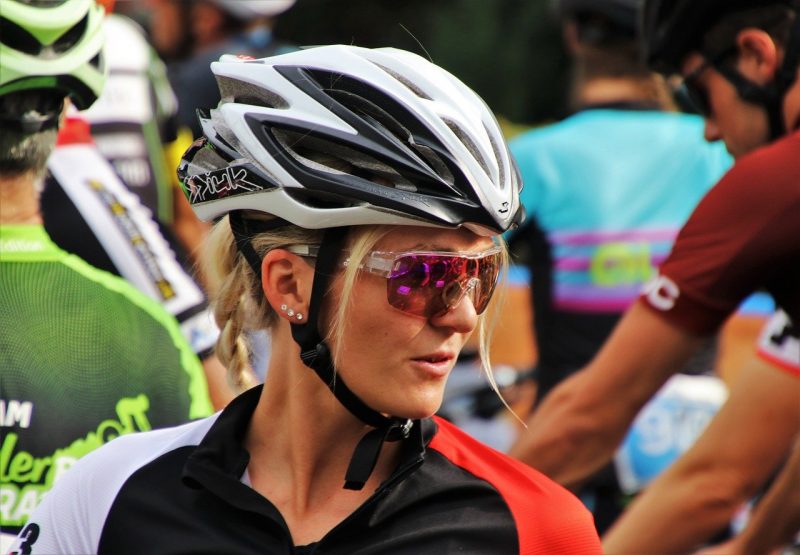Bike sports are hitting the headlines at the moment after Team GB’s cycling teams won an amazing 12 medals at the Tokyo Olympics despite having their funding cut by over £5 million. As a result, we’re seeing a renewed interest in cycling in the UK.
Did you know that cycling has a range of sub-categories? Depending on your skills, fitness, and thrill-seeking side, you could do any number of cycling sports.
Because these different sports range in terms of speed, danger levels, and skill levels, they all require different types of helmets.
With some help from bike retailer, Leisure Lake Bikes, we’ll explore the best helmet for each type of cycling sport.
1. Road cycling
Road cycling is an exciting discipline and one of the most popular subcategories of this sport. The best helmets for road cycling are well-ventilated and comfortable, especially because road cycling can often involve long distances – especially if you’re racing. Overheating is a common problem when road-racing, so look out for a helmet that has oversized exhaust and intake vents.
For the professional road cyclists among us, avoid helmets with peaks. They’re not the most aerodynamic helmet style, which means they could add unwanted seconds to your time. An aero helmet will suit you well if you’re a racer or triathlete – but be warned, they’re slightly less ventilated. A lot of models will also include storage for your sunglasses, which are essential for any road racer.
2. Mountain biking
If you’re a bit of a daredevil and you’ve been inspired to take up mountain biking by Tom Pidcock’s cross-country gold, you’ll need a helmet that offers the right level of protection. Standard mountain bike helmets will offer some ventilation, but they excel in protecting your head, which is by far the most important consideration for mountain biking. You’ll also notice that they’re a little less aerodynamic because that’s not especially important in mountain biking – your focus is technique and safety, not speed. Many will also come with a peak for extra protection and to reduce glare.
If you’re on a lift-access terrain that doesn’t require pedalling, you’ll need even more protection. That’s where full-face helmets come in. Because you’re taking on a more dangerous challenge, you need to protect your entire head and your face. While visually they’re similar to motocross helmets, they’re more lightweight, so they won’t weigh you down.
3. BMX biking
Another one for the thrill-seekers, BMX biking comes in many forms, from freestyle to racing. Freestyler Charlotte Worthington and racer Bethany Shriever brought our attention to BMX biking through their amazing gold medal wins during the Olympics. It was inspiring to see Worthington bring home the gold in the first-ever Olympics BMX freestyle event!
Helmets designed for BMX biking are often more shell-shaped than those used in less risky forms of cycling. The rounded design offers the best protection possible. The hard shells are accompanied by foam liners, offering comfort as well as protection from head injuries.
Some experts recommend full-face helmets in BMX biking as well as mountain biking because of the increased risk of injuries. Many pump tracks and races require riders to wear full-face helmets to protect their jaw as well as their skull.
4. Track cycling
When it comes to track cycling, speed is key. This is the sport where you’ll see the most aerodynamic and slick headgear – we certainly saw plenty on Team GB, who took the most velodrome medals of any nation at the Tokyo 2020 Olympic Games.
Track cycling helmets with long tails are common thanks to their streamlined design, which can reduce drag by 10 to 20 times. The tail goes down to the top of your back when cycling and therefore keeps the airflow on your body for longer – something track racers will know is key to fast finishing times.
If your event is a longer duration or distance, however, a shorter-tailed helmet may be more suitable. This is because the longer you cycle for, the more difficult it is to keep your head in the optimal position with a long-tailed helmet. If your head isn’t in the optimal position, this could end up causing more drag than you’d have without a specialist helmet.
5. Everyday cycling
For those of us who cycle to work, the shops, or for casual fitness, our helmet requirements are less stringent. If you already own a helmet for another form of cycling, like mountain or road biking, you can use this for your everyday rides too. However, if you only cycle casually, you can find a helmet that hits the perfect balance between comfortable, functional, and stylish.
Like road cycling helmets, a well-ventilated option is best because it’ll prevent sweat build-up – nobody wants to get to work all hot and bothered. Choosing one with reflective details or even a built-in light is a good option to make you more visible to road users and increase your visibility in dark or misty conditions.
The Tokyo 2020 Olympics Games has done wonders for cycling as a sport. Thanks to the breakthrough successes of athletes such as Charlotte Worthington and the introduction of new cycling competitions, we have a renewed interest in cycling as a nation. Whether you’re a seasoned road racer or you casually cycle to work, you’ll need a helmet that’s designed to meet your needs.
Sources:
https://www.sigmasports.com/hub/guides/Helmets-Explained-A-Guide-To-Different-Cycle-Helmet-Styles
https://www.coachmag.co.uk/cycling-gear/8050/the-best-bike-helmets-for-commuters










